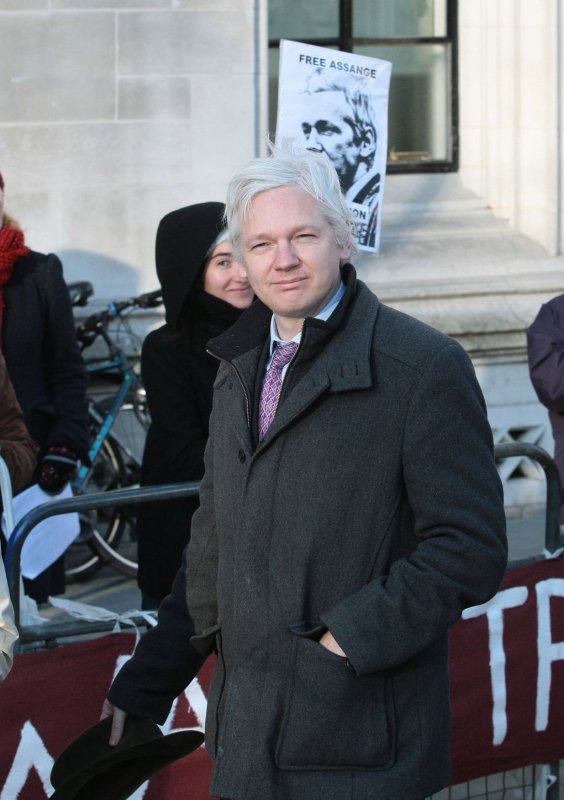Wikileaks founder Julian Assange arrives for the final day of his Supreme Court hearing to avoid extradition to Sweden in 2012. He recently got Internet access back after it was suspended in March. File Photo by Hugo Philpott/UPI |
License Photo
Oct. 16 (UPI) -- Ecuador officials have told WikiLeaks founder Julian Assange, who has been in asylum in the country's British embassy for six years, to obey house rules or lose asylum.
The new house rules range from cleaning his bathroom and taking better care of his cat to having to obtain approval for visitors for diplomatic staff three days in advance, The Guardian reported.
The 10-page protocol, which has been applied since this weekend, makes an exception to the restriction on visits without three days notice for medical assistance, Codrigo Vidrio reported.
Assange, a 47-year-old Australian, who published thousands of U.S.-classified documents on WikiLeaks website, risks losing not only Internet access, which he just regained over the weekend, but also diplomatic asylum at Ecuador's British embassy, if he doesn't follow house rules.
The new protocol also stated that starting December 1 the diplomatic mission would no longer pay for his food, laundry or other costs of his stay, and Assange must also pay for quarterly medical checkups.
"It's virtually a prison regime," Carlos Poveda, Assange's lawyer in Quito told the Guardian. "This new regime goes against his basic human dignity as an asylee," he said.
The Ecuadorian government had suspended Assange's Internet access in March after his tweets accused Britain and the United States of "poor diplomacy," regarding the expulsion of Russian diplomats. Ecuador's embassy said the tweets violated an agreement that he should refrain from "messages that supposed an interference in relation to other states," and hurt the country's international relations.
The government lifted the Internet restrictions over the weekend by allowing him to access the Internet through his mobile phone and personal computer to reduce isolation "following meetings between two senior U.N. officials and Ecuador's president, Lenin Moreno, on Friday," WikiLeaks said in a statement.
"It is positive that through U.N. intervention Ecuador has partly ended the isolation of Mr Assange although it is of grave concern that his freedom to express his opinions is still limited," WikiLeaks editor-in-chief Kristinn Hrafnsson said.
Assange has been holed up in Ecuador's British embassy since June 2012. He originally sought asylum to avoid extradition to Sweden over rape allegations. Although the Swedish investigation has been dropped, Assange fears an arrest for bail breach in the sexual assault case would allow him to be extradited to the United States for publishing the classified documents on WikiLeaks.
The website grabbed worldwide attention in April 2010 when it released footage of U.S. soldiers fatally shooting at least 18 civilians from a helicopter in Iraq.
Assange gained citizenship in Ecuador late last year.















